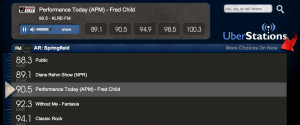 A new radio tuner hit the web on Thursday, coming from the folks who bring you the online radio recorder app, DAR.fm. According to CEO Michael Robertson UberStations differs from existing radio platforms in that it provides a “unique recommendation engine” that helps the user find other stations with programming similar to what you’re listening to now.
A new radio tuner hit the web on Thursday, coming from the folks who bring you the online radio recorder app, DAR.fm. According to CEO Michael Robertson UberStations differs from existing radio platforms in that it provides a “unique recommendation engine” that helps the user find other stations with programming similar to what you’re listening to now.
The site’s spartan interface, modeled after a spartan radio, worked equally well for me in Chrome and Firefox on my MacBook Pro, and in Safari on my iPad. It was a little squeezed and tiny on my ancient iPhone 3G. It would be nice to see a mobile optimized interface for smartphones and smaller tablets.
You can search by city, zip code or call letters, which results in a list of all that market’s stations, displaying what each is playing, provided that metadata is available. When you select a station it goes into one of five spots that, to me, mimic a car radio preset. Then you click the play button to listen.
The presets seem to reset when you start a new search, which limits their utility. Also, the preset only displays the station’s frequency. Seeing stations call letters and/or logos would be much more useful.
 The recommendations come into play when you click “More Choices on Now” underneath the UberStations logo. With remarkable speed, you’ll get a list of stations currently playing music or programs similar to your current selection. The results include stations from anywhere in the US playing something related. Though you can’t search Canadian or Mexican cities, stations from these countries will appear in border markets like Detroit and San Diego.
The recommendations come into play when you click “More Choices on Now” underneath the UberStations logo. With remarkable speed, you’ll get a list of stations currently playing music or programs similar to your current selection. The results include stations from anywhere in the US playing something related. Though you can’t search Canadian or Mexican cities, stations from these countries will appear in border markets like Detroit and San Diego.
The recommendations appear to be driven by station format, which is a rougher guide than, say, Pandora’s musicological recommendation engine. When I asked for more music like the 80s first-wave alternative track “How Soon Is Now” from the Smiths, I got reasonable recommendations like a station playing R.E.M., along with somewhat less appropriate suggestions, such as classic rock stalwarts Credence Clearwater Revival and Billy Squier.
Robertson says that UberStation also plays potentially higher quality AAC streams in the browser, in addition to the ubiquitous MP3 streams. Other services, like TuneIn, spawn an app like iTunes to handle AAC streams. However, which stream you get (MP3 or AAC) is opaque to the user.
Finally, Robertson tells me that the service will soon integrate podcast feeds, so that you may get recommendations for shows that aren’t on live, but are available on demand.
UberStations’ responsive and clean interface make it fun to scan the virtual dial and come up with stations in cities you’ve probably never heard of. In particular, I like how well it works on a tablet right in the web browser without having to install a memory-hogging app.
Overall it’s a nice first shot, and a welcome addition to the online radio player space. With some additional polish and podcast integration I think it will become even more useful.


